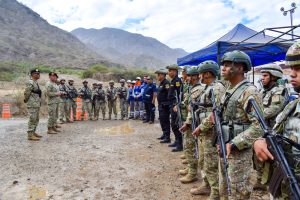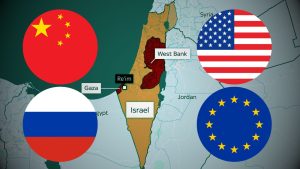Introduction
What is happening in Afghanistan will cause many misfortunes and regrets not only in the United States, but also throughout the Western Hemisphere. In practice, the fall of the country into the hands of the Taliban takes the situation back to 2001 in such a way, that it is legitimate to ask: What was the point of sacrificing two thousand lives, activating the Atlantic Alliance for the first time in its history and investing more than a trillion dollars over twenty years?[1] Of course, it can be argued that history is not static, that there is no valid determinism and that, for example, Vietnam was already, in 1995, twenty years after its victory, a country connected to the United States without the need for Washington to stay in Hanoi indefinitely.[2]
However, what is happening in Kabul does not resist, in any case, the statement of the US Secretary of State according to which all the objectives that Washington had set were achieved in Afghanistan. Rather, it could be argued that the White House has been the victim of a certain “performance anxiety,” that frustrating impotence caused by a high degree of stress that immobilizes and prevents the tasks undertaken from being fully carried out.[3] To put it in other terms, the distorted perception of reality by the US Secretary of State could be a good example of what we will call “apoplectic diplomacy.”
By analogy with medicine, this stroke diplomacy is characterized by a set of dysfunctions that appear abruptly and suddenly, altering the relationship between decision-making, the historical continuity of a problem and national interests, thus creating paralysis between the foreign service and the coercive apparatus of the State, no matter how powerful and sophisticated it may be. In this context, there are several neuralgic points of the United States’ performance that are significantly affected in the “Afghan case”, which is how, from this moment on, such a diplomatic-military fiasco will be studied in political science and international relations.[4]
The nature of the actor and the threatening factor
Some analysts have wishfully conveyed the idea that the Taliban of today are no longer the cruel executioners of the nineties and that it is possible to arrange a constructive future with them in the area, assimilating them as new best friends. Unfortunately, this illusory assessment has been quickly undermined by incontestable facts, such as those recorded by the UN itself in the report of the Norwegian Center for Global Analysis, which highlights the authentic hunt for opponents that, without being new, has been systematically accentuated in the past few weeks.[5]
Just as it was impossible for the Castro, Sandinista, and Chavista revolutions to be akin to the United States, the Taliban’s return to power will only serve to confirm that fundamentalism exists and that violent anti-Western extremism is not a mere conjunctural ideological pretext,[6] as it can be attested to firsthand by the Hazara ethnic minority. Said bluntly, the new emirate can only be understood as a mafia entity, promoter of terrorism, a gangster narco-state and “never an inclusive democracy,” as Commander Waheedullah Hashimi has clearly expressed: “It is about the sharia; that is all.”
Can anyone – in the best of cases – force the intellect to imagine a syncretism, whether artificial or forced, between theocracy and polyarchy?
Motivations, inspirations and endorsements
Through methods of disinformation and cognitive warfare, the emirate will not only attract militants from everywhere to attack select infidel targets, but it will also turn its territory into a renewed multi-domain and multi-level training and unrestricted war operations center. By harmoniously combining non-obvious warfare and kinetic operations (“cyberkinetic warfare”), the Taliban regime will make its operational horizon explicit, one with both territorial expansionism (in the style of ISIS) and global atomization through socio-spiritual franchises (Al Qaeda mode). Consequently, it will make transversal symbiotic terrorism a multi-functional strategic concept, capable of confounding the West, but, above all, to weave all sorts of coalitions based on specific and compatible interests rather than on Islamic orthodoxy.[7] For this reason, it would not be surprising to have some kind of understanding with Moscow (which until now has kept the Taliban movement on its list of terrorist organizations) or Tehran, linking even Hamas and Hezbollah because of a consummate anti-Semitism that links well with the fight against Yankee imperialism.
Therefore, some fragile but traditional liberal democracies, such as Colombia, will have to prepare to face the expanded jihadist threat with all the means at their disposal. A global threat that will have (or will continue to have) Caracas as the spearhead in Latin America and the Caribbean, especially now that Bogotá has pleased Washington by committing to host four thousand Afghan refugees whose pensions will be covered entirely by Biden’s government.
Deterrence and rationality
In any case, the brutality that has characterized the Taliban has now been contrasted with the self-restraint they have exhibited by respecting the tiny control of the Harzai airport exercised by the Alliance troops who have been overwhelmed by the improvised evacuation operation.[8] In other words, that chaotic eviction has been a concession, marked by despotism, yes, but a concession, after all that the new regime has made to the evacuees, starting with the dramatic way in which the few Spanish soldiers, or the French ambassador, were able to leave their headquarters to reach their destination. In other words, if Hibatullah Akhundzada – owner and lord of the vast arsenal abandoned by the great power – had thought to give the order to destroy the handful of remaining soldiers, nothing would have prevented him, not even the belated warning of President Biden (uttered in the middle of his summer vacation) that “any attack on the evacuation plan will have a clear and immediate response.”
And it is that if the Taliban have refrained from giving that order, they have not done so in response to the international law of armed conflicts, or only because of their need to renegotiate diplomatic relations, but for prevailing reasons directly related to their true perception that is this sneaking: American deterrence has failed, to the point where there is space for magnanimity! In practice, that means that the United States now has an additional problem of profound dimensions: that of making real sense of its capabilities in the face of shared threats.
Just as Mao Tse-Tung likened the US nuclear power to a “paper tiger”, or Vo Nguyen Giap was delighted with his thesis of the moral victory over the occupier, non-state groups such as Boko Haram, Al-Shabab, Abu Sayyaf, or Jamaah Ansharut Daulah will now be drawing their own conclusions. But not only them. Also some States concerned, for better or for worse, as can be seen in the relationship between North Korea / South Korea, Iran / Israel, Cuba / Colombia, China / Taiwan, or Russia / Ukraine.
Specifically, after analyzing what is happening in Kabul, how much will Pyongyang continue to feel compelled to respect Seoul, despite the presence of US troops in the South? And, on the other hand, how much can Israel or Taiwan continue to trust in the essential commitment of the Democratic government in the face of its existential threats?[9] Recalling Cold War Berlin, why would Biden put Washington at risk today just for defending Jerusalem or Taipei?
Consequently, is it not barely understandable that, in the face of such hesitation and uncertainty, the Jewish state is suspicious of the White House, takes a prudent distance and becomes increasingly entrenched both in its nuclear doctrine based on deliberate ambiguity and on what may be more importantly, the Abrahamic Accords signed with moderate Arab countries?
To be practical, deterrence is only valid if the antagonists consider it credible, sustainable and, above all, persistent. That is, if it manages to discourage the adversaries, even in the extreme case that they dare to put it to the test by undertaking a skirmish, or an attack. But given the signs of inconsistency on Afghan soil and such erratic allied behavior, it is hardly logical that hybrid and parasitic threats gain strength to continue challenging the White House, insistently measuring its response capacity (no longer its will anticipation, not even its strategic advantage) to seize key spaces and resources in the regional and global contest.[10]
Obviously, the preservation push of the US presidency has led Biden to blame the Afghan armed forces for their negligence and lassitude, arguing that they refused to fight. But this attitude, far from vindicating him, condemns him even more because it highlights both the inability to train an army well, having had 20 years to achieve it, and the ineptitude of inter-agency and integrated intelligence to correctly calculate the potential of rivals.[11]
Weren’t the Taliban so surprised by the ease with which they seized the capital, like the chief of staff of the United States, General Mark Milley, in arguing that “there was nothing that I, or someone else saw that indicated a collapse in 11 days of that army and that government”? In other words, nothing is as serious as suggesting that those fighters who accompanied Washington from day one in the fight against the perpetrators of the 9/11 attacks are simply cowards.[12]
That insinuation, or assertion (however you want to see it), far from praising the enemy, or disrespecting the loyal collaborator, undermines whoever pronounces it because, deep down, it dishonors the fellow citizens who are victims of the attacks in whose name one of the most complex operations in military history closed unilaterally and with a stroke of the pen in a climate of evident anarchy, inconsideration and insensitivity.
3R: Resistance – Reconstruction – Resilience
At this point, it is necessary to ask a question with which any exercise tending to measure the degree to which the national interest is compromised in order to take on operations abroad is necessary: what was the United States doing in Afghanistan? What was the real reason that justified its presence there?
Even agreeing with President Biden that the intention of his country “was never to build a state,” what seems incontrovertible is that, beyond reprisals or retaliations, after the hostilities that eradicated the extremist regime, the occupation was consecrated completely to rebuild.
Beyond the fact that tribalism and political anthropology advise against a liberal democratic format materialized in a parliamentary or presidential system, or in a federal or autonomous territorial model, the truth is that the objective was to prevent Afghanistan from continuing to be an example of a collapsed state, drugged and rogue to become functional and integrated into the international community.[13]
It is clear that this was difficult to achieve, but he did not have to fall into the lightness of fleeing overnight, throwing away the large investments, many of them embarrassingly useless, which have been detailed without embarrassment but with regret and dismay for John Sopko, the inspector general for the reconstruction of Afghanistan: “It is hard to say that it was all wasted.”
And it will be hard to say, but the mistakes are certainly numerous, standing out – for example – the 28 million dollars that Washington assigned to create a military uniform with a camouflage pattern to be used in wooded areas, when only two percent of the country is covered with forests. Anecdotes aside, the recovery and re-adaptation model neglected the indicators of strategic resilience, leaving the country with the nowhere near possibility of becoming (again) a platform for terrorism.
So, will the United States begin again to channel resources, now towards the armed minority that under the command of Ahmad Masud, the son of the mythical anti-Taliban commander, Ahmad Shah Masud, is already proclaimed as the axis of the armed opposition?[14]
Models of presence in the future
Undoubtedly, this will not be the last time that the United States, in particular, and NATO in general, are involved in highly complex operations, many of which will also be “unfinished wars”, as those of Korea and Taiwan could be described. In fact, unfinished wars are not necessarily toxic or harmful, and can be interpreted, rather, as an imperative, as an inescapable reality.[15]
No one doubts the courage and bravery of an army like Seoul’s, but without the dissuasive presence of US troops stationed on the peninsula, what could have been the behavior of the Kim Jong-il / Kim Jong- un dynasty? one who, has dared to challenge, provoke, harass, and even attack free Korea?
In summary, all this implies the need to take into account that there are three schemes of strategic solidarity presence through which a great power such as the United States can contribute to stabilizing an area through a persistent balance of power system. Two of them have been clearly unsuccessful and therefore not plausible; the third, on the other hand, is the one with the best results, being precisely the one used in the two cases just mentioned: South Korea and Taiwan.
The first, the parasitic one, consists in the fact that the supporting power supplants the local forces, assuming all the operations and responsibilities, in such a way that the partner is no more than a pawn and instead of strengthening himself, he cancels himself, which is In practice, what could have happened in Vietnam and Afghanistan itself, but also what could be happening in Iraq.
In the second, that of commensalism, the power that accompanies is the one that usually benefits, in a format of containment of equally powerful adversaries, but the accompanied country, or in which the power is housed, is not really nourished in terms of development and freedoms, something that happened with the United States during the classic interventionism of the Cold War in Central America, and it happens today with Russian assistance to Syria, Cuba, Venezuela or Nicaragua.
On the other hand, in the third, that of mutualism, both actors are benefited, proportionally sharing risks and benefits because by sharing values, ideology or, in any case, deep interests, they are progressively and steadily strengthened. As already mentioned, this is the system that characterizes the relationship of the United States with South Korea and Taiwan, but also with the Baltic countries, those of the Cooperation Council in the Persian Gulf, Kosovo, or Egypt.
Conclusion
The apoplectic diplomacy that characterized the United States’ relationship with Afghanistan prevented the framework of understanding on security from becoming more and more refined, profitable, mutualistic and based on the 3Rs (resistance, reconstruction and resilience).
Ultimately, Washington will have to do much more effort than provided to correct the performance anxiety errors made in the Afghan case. But the lessons learned and the intellectual pressure it is receiving not to repeat the same behavior in other contexts and moments will contribute positively to revalue the chain of alliances against terrorism and for freedoms throughout the planet.
Endnotes
- Bryan M. Jenkins, “Getting Out of Forever Wars: What Are Biden’s Options in Afghanistan?,” RAND Corporation (March 12, 2021), https://www.rand.org/blog/2021/03/getting-out-of-forever-wars-what-are-bidens-options.html, (accessed on august 23, 2021) ↑
- James Dobbins, “The Biden Administration’s Afghanistan Challenge,” RAND Corporation (March 16, 2021), https://www.rand.org/blog/2021/03/the-biden-administrations-afghanistan-challenge.html, (accessed on august 23, 2021) ↑
- Muhammad Tariq, et al., “The Theory of War and the Future of Peace in Afghanistan,” International Journal of Innovation, Creativity and Change (14, No. 12, 2020), https://www.ijicc.net/images/Vol_14/Iss_12/15926_Tariq_2020_E1_R.pdf, (accessed on august 23, 2021) ↑
- Leoni Connah, “US intervention in Afghanistan: Justifying the Unjustifiable?,” South Asia Research (November 6, 2020), https://journals.sagepub.com/doi/full/10.1177/0262728020964609, (accessed on august 23rd, 2021) ↑
- BBC, “The ‘door-to-door hunt’ that the Taliban launched against ‘Western collaborators’ according to a confidential UN report,” BBC Mundo (August 20 , 2021), https://www.bbc.com/mundo/noticias-international-58272682 , (accessed on august 23rd, 2021) ↑
- Daniel Alm, The US invasion of Afghanistan: A justified war? : A content analysis using just war theory (Statsvetenskapliga institutionen, Uppsala Universitet, 2021), https://www.diva-portal.org/smash/get/diva2:1575088/FULLTEXT01.pdf, (accessed on august 23, 2021) ↑
- Sarit Zahavi “Afghanistan is lost. What’s next?,” Aurora / Alma Research and Education Center (August 22, 2021), https://aurora-israel.co.il/afganistan-esta-perdido-que-es-lo-que-sigue/, (accessed on august 23, 2021) ↑
- Tony Blair, “Why We Must Not Abandon the People of Afghanistan – For Their Sakes and Ours,” Tony Blair Institute for Global Change (August 21, 2021), https://institute.global/tony-blair/tony-blair-why-we-must-not-abandon-people-afghanistan-their-sakes-and-ours, (accesssed on august 23, 2021) ↑
- Yossi Kuperwasser, “The Lesson of US Strategy in Afghanistan: Israel Must Recognize the Limits of Superpower Support,” Aurora / Jerusalem Center for Public Affairs (August 21, 2021), https://aurora-israel.co.il/la-leccion-de-la-estrategia-de-ee-uu-en-afganistan-israel-debe-reconocer-los-limites-del-apoyo-de-la-superpotencia/, (accessed on august 23, 2021) ↑
- The Wall Street Journal / The Editorial Board, “How Biden Broke NATO. The chaotic Afghan withdrawal has shocked and angered U.S. allies,” The Wall Street Journal (August 19, 2021), https://www.wsj.com/articles/how-joe-biden-broke-nato-allies-boris-johnson-angela-merkel-emmanuel-macron-11629406300?mod=hp_opin_pos_1 , (accessed on august 23, 2021) ↑
- Yoel Guzansky and Daniel Rakov, “The Core of the Regional Struggle: Actors or Camps?,” Strategic Assessment, The Institute for National Security Studies, INSS (24, Number. 3, July 2021), https://strategicassessment.inss.org.il/wp-content/uploads/2021/07/Adkan42.3Eng_3.pdf?utm_source=activetrail&utm_medium=email&utm_campaign=Strategic%20Assessment%20-%20volume%2024%20issue%20no.%203, (accessed on august 23, 2021) ↑
- Condoleeza Rice, “The Afghan people didn’t choose the Taliban. They fought and died alongside us,” The Washington Post (August 17, 2021), https://www.washingtonpost.com/opinions/2021/08/17/condoleezza-rice-afghans-didnt-choose-taliban/, (accessed on August 23, 2021 ↑
- Udi Dekel, “Six Findings on the Collapse of the Afghan Government,” Aurora / The Institute for National Security Studies, INSS (August 19, 2021), https://aurora-israel.co.il/seis-conclusiones-sobre-el-colapso-del-gobierno-afgano/?utm_source=Aurora+Israel&utm_campaign=43194eb1c9-EMAIL_CAMPAIGN_2021_08_19_02_37&utm_medium=email&utm_term=0_05444763c4-43194eb1c9-84399308, (accessed on august 23, 2021) ↑
- Ahmad Massoud, “L’Afghanistan n’a pas perdu la guerre,” La Règle du Jeu (August 16, 2021), https://laregledujeu.org/2021/08/16/37530/afghanistan-ahmad-massoud-nous-restons-seuls-debout-mais-nous-ne-cederons-jamais/, (accessed on august 23, 2021) ↑
- Michael Eisenstadt, “Beyond Forever Wars and Great Power Competition Rethinking the U.S. Military Role in the Middle East”, The Washington Institute for Near East Policy (June 2021), https://www.washingtoninstitute.org/media/4591, (accessed on august 23, 2021) ↑






